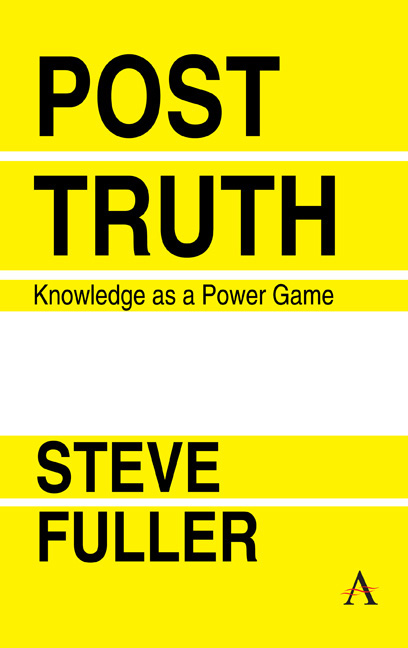Book contents
- Frontmatter
- Dedication
- Contents
- Acknowledgements
- Introduction: Science and Politics in a Post-Truth Era: Pareto's Hidden Hand
- 1 Brexit: Political Expertise Confronts the Will of the People
- 2 What Philosophy Does and Does Not Teach Us about the Post-Truth Condition
- 3 Sociology and Science and Technology Studies as Post-Truth Sciences
- 4 The Post-Truth about Academia: Undiscovered Public Knowledge
- 5 Science Customization: A Project for the Post-Truth Condition
- 6 The Performance of Politics and Science on the Playing Field of Time
- 7 Forecasting: The Future as the Post-Truth Playground
- The Argument in a Nutshell
- Glossary
- References
- Index
3 - Sociology and Science and Technology Studies as Post-Truth Sciences
Published online by Cambridge University Press: 14 July 2018
- Frontmatter
- Dedication
- Contents
- Acknowledgements
- Introduction: Science and Politics in a Post-Truth Era: Pareto's Hidden Hand
- 1 Brexit: Political Expertise Confronts the Will of the People
- 2 What Philosophy Does and Does Not Teach Us about the Post-Truth Condition
- 3 Sociology and Science and Technology Studies as Post-Truth Sciences
- 4 The Post-Truth about Academia: Undiscovered Public Knowledge
- 5 Science Customization: A Project for the Post-Truth Condition
- 6 The Performance of Politics and Science on the Playing Field of Time
- 7 Forecasting: The Future as the Post-Truth Playground
- The Argument in a Nutshell
- Glossary
- References
- Index
Summary
Sociology and the Social Construction of Identity
It is tempting to understand ‘post-truth’ from the standpoint of those who promoted it to become Oxford English Dictionary's 2016's word of the year. As we have seen, the word pejoratively refers to those who refuse to listen to reason and evidence but instead resort to emotion and prejudice. However, to a sociologist of knowledge this formulation itself sounds too self- serving to be true. After all, the people who tend to be demonized as ‘post-truth’ – from Brexiteers to Trumpists – have largely managed to outflank the experts at their own game, even if they have yet to succeed in dominating the entire field of play. Empirically speaking at least, this suggests that the experts are not as rational and evidence based as they themselves thought and the post-truthers are not as emotional and prejudiced as the experts have thought them to be.
My own way of dividing the ‘truthers’ and the ‘post-truthers’ is in terms of whether one plays by the rules of the current knowledge game, or one tries to change the rules of the game to one's advantage. Unlike the truthers, who play by the current rules, the post-truthers want to change the rules. They believe that what passes for truth is relative to the knowledge game one is playing, which means that depending on the game being played, certain parties are advantaged over others. Post-truth in this sense is a recognizably social constructivist position, and many of the arguments deployed to advance ‘alternative facts’ and ‘alternative science’ nowadays betray those origins. They are talking about worlds that could have been and still could be – the stuff of modal power.
The 2017 death of the original sociological promoter of ‘social construction’ by name, Peter Berger, co- author of the classic The Social Construction of Reality (Berger and Luckmann 1966), provided an opportunity for his detractors to link him to the post-truth mentality, as he had received financial support from the US tobacco lobby in the 1970s and ‘80s. Indeed, he portrayed the anti- smoking campaign as primarily a moral crusade in his contribution to the landmark pro- smoking volume, Smoking and Society (Tollison 1985).
- Type
- Chapter
- Information
- Post-TruthKnowledge as a Power Game, pp. 53 - 68Publisher: Anthem PressPrint publication year: 2018

